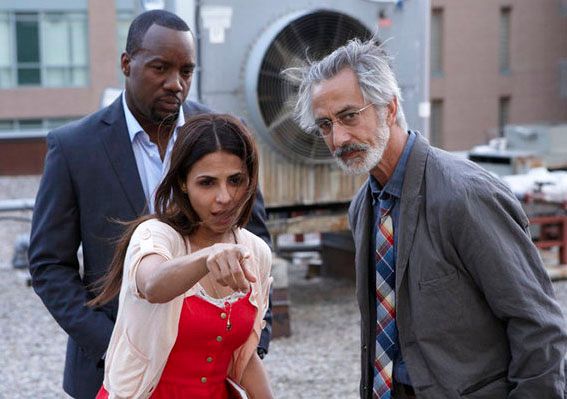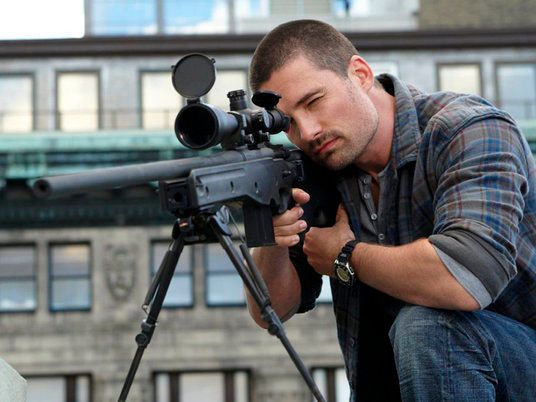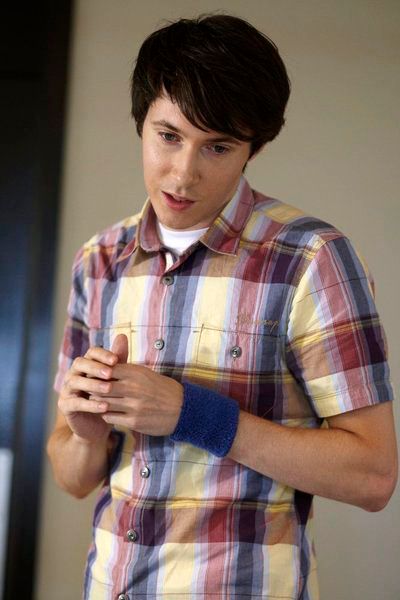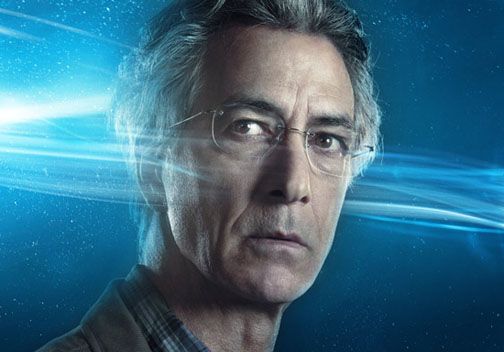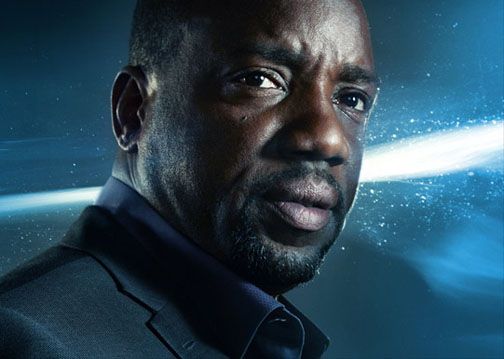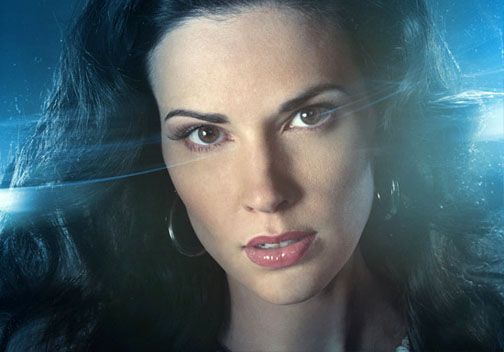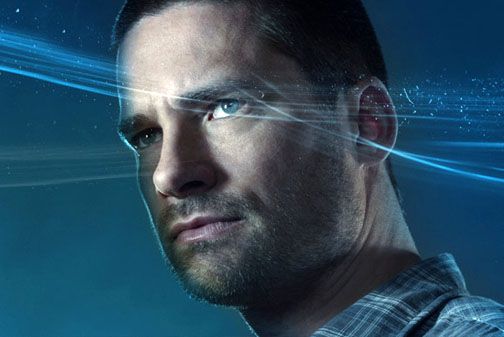The latest original scripted series for SyFy, Alphas is an action-packed thriller from writers Zak Penn (The Avengers, X-Men: The Last Stand) and Michael Karnow, that follows the lives of five ordinary people who become an extraordinary team with the power to stretch the capabilities of the human mind due to brain anomalies that have given them enhanced mental and physical abilities. Operating within the Defense Criminal Investigation Service of the U.S. Department of Defense, and led by pre-eminent neurologist and psychiatrist Dr. Lee Rosen (David Strathairn), the team – which includes former FBI Agent Bill Harken (Malik Yoba), who can summon strength by activating the fight-or-flight response at will; Rachel Mizrahi (Azita Ghanizada), who can enhance one sense while rendering her remaining senses temporarily useless; Gary Bell (Ryan Cartwright), who has the ability to read a wide range of frequencies including television, radio, and cell phone signals; Nina Theroux (Laura Mennell), who can influence the specific neural pathways in the cerebral cortex that leave the brain vulnerable to suggestion; and Cameron Hicks (Warren Christie), who possesses flawless aim, perfect balance and greatly enhanced motor skills – investigates cases that point to others with Alpha abilities, while keeping their own gifts a secret.
During an exclusive interview with Collider, executive producer Zak Penn talked about how the show developed out of real research about the CIA trying to recruit people who were psychic, the time-intensive schedule of television versus film, how much he’s enjoyed getting to create a mythology from scratch, why it was important for these Alpha abilities to have consequences, and what having Ira Steven Behr as a showrunner has meant to the development of the series. Check out what he had to say after the jump:
Question: How did Alphas come about for you?
ZAK PENN: Michael Karnow, who co-created the show with me and wrote the pilot with me, is a good friend of mine. He’s acted in the movies I’ve directed. And, he came to me with all this research about the CIA trying to recruit people who were psychic. The Men Who Stare At Goats is a version of it, that’s based on a true story. He talked about, “Wouldn’t it be interesting if some of those programs had actually worked out? What if they had figured out that people could actually do these things and learned how to use it?” I said, “Hey, that’s kind of a cool idea, actually.” And that very quickly evolved into the idea that became Alphas. It was originally titled Section 8, and we lost the rights to that title because there’s a video game with it, but that’s how it started. We started working on it and we sold it once to ABC, but then the writers’ strike came, and then we sold it again to SyFy. It all began with Michael’s idea.
Were there changes that you made, once you sold it to SyFy?
PENN: For sure. When we were at ABC, there was a lot more resistance to the sci-fi elements of it, which is pretty much what’s left, whereas when we went to SyFy, they were not resistant to the sci-fi elements. At ABC, I felt like we were constantly trying to pretend that it wasn’t a science fiction show while still writing a science fiction show. Once we got rid of that, it just freed us up a lot more to get into the stuff that we wanted to do. It was a relief, honestly.
As a writer, is it difficult for you to decide to devote so much time to one project, since you’re also a successful screenwriter?
PENN: Yeah, it is hard. It was one thing to go work on the pilot, but when they picked up the show, the decision of, “Okay, I’m going to stop everything else, I’m going to stop all the feature projects I have, and devote my time to this,” is definitely a lifestyle choice. It’s definitely a big choice because I have three kids and a wife and two dogs. It’s much, much harder working on a show than it is working on a movie. It really is. Even if you’re in production, that production lasts for a set period of time. A TV show goes on for months and months and months.
It is a tough call, but I mostly did it because we ended up assembling this great cast. I didn’t know what kind of cast we would get. I was hoping we would get people like David [Strathairn], Malik [Yoba], Azita [Ghanizada] and Ryan [Cartwright], and all these other people, but you never know who you could end up with. So, once the cast came together and the pilot came together, and I realized this was a chance to actually do something where I don’t have to qualify anything. If you like it, that’s what we wanted it to be. That’s a relief to me. Those big movies, they’re never your movie. They’re everybody else’s movie, and you’re a part of it. So, once that happened, I was like, “If I don’t actually work on a show now, when am I going to do it? I might as well give it a whirl.”
Is it fun to do something like Alphas, where you can be in your own little bubble and work on it and present it to people without the scrutiny you get from working on comic book films?
PENN: Yeah, and the mythology of it is something that you’re creating, so you’re defining the limits of it and saying, “Here’s what Dr. Rosen (David Strathairn) is going to do, and here’s what he’s not going to do.” If you have an idea for a character, you don’t need the rights to it. It’s not complicated by the fact that you can’t do something because it’s part of a franchise that’s separate. You’d be shocked how often that’s a big problem, where you have some character you really want to do and you can’t do it because they’re technically from a different comic book source. To create that from the ground up is a relief, frankly. It’s nice to be like, “There can be a character like that because I just made him up, and he is like that. That’s the way it is.” With The Avengers, by the time I got to the script, we had already completely locked ourselves into what characters were going to be there. It was like doing X-Men 3. You can add some new characters, but you’ve got 13 or 14 characters that you have to service, who are already there. With Alphas, that’s not the issue.
Alphas falls on the heels of things like Heroes, and other shows where ordinary people are in extraordinary circumstances, with superhuman abilities emerging. Were there any pitfalls that you saw from those other shows you really wanted to avoid?
PENN: Well, I really did try to start from a totally different paradigm. The show is probably closer to The Mentalist or The X-Files, in its pitch. That’s where we started from. And then, I got in some of the stuff I’ve always wanted to do in the superhero genre. I managed to find the real world equivalent of it. So, as opposed to Heroes, which is completely serialized, we purposely started from the totally other direction, in terms of what the show is actually like, in the same way that Law & Order is nothing like Heat. They’re two opposite ends of the genre. For me, I was less worried about that than I was about other procedural type shows that had some overlap with us. But, luckily, they all got canceled.
Was it easy to find a balance between developing the characters and bringing in the sci-fi elements and the action?
PENN: Yeah, I would say they weren’t really ever that separate because the sci-fi elements are contained in the characters themselves. Once we figured out what we wanted the main characters to be, that was it. That’s what they are. One of my pet peeves, in general, about science fiction or comic book movies is when you have characters that have extraordinary abilities, and yet you construct sequences that are more about the sequence or the location than they are about their ability. I want to see their ability. I want to see what it is they can do and how that makes it different. I don’t care if it’s in an alley or on the top of a building or on Mt. Rushmore, it’s about how interesting their ability is. If you told Nina (Laura Mennell) to break into the Pentagon, what would that be like? That, to me, is a fascinating prospect, but it’s also fascinating if it happens in an office building because it’s about how she deals with the fact that her power only works for a few minutes at a time. If she pushes you, in a few minutes, you’re going to realize what’s happened to you and come chasing after her, so she has to keep moving.
Was it important to you for these Alphas to have consequences with using their abilities?
PENN: That was inherent to the idea. From the very beginning, the idea was that no one will just have an Alpha ability without any downside. Sometimes the downside is that it’s made them a sociopath and they have no empathy. Sometimes the downside might be that they’re only going to live to be 30. There’s got to be some consequence. It’s a trade-off. You never want it to be like, “Well, who wouldn’t want that ability?”
Do you get into the explanation right away, as to why these people are like this and if other people know about them?
PENN: Yeah, we do. We explain that in the pilot. First of all, people don’t know that there’s a connection between all the people who have these types of abilities. Rosen (David Strathairn) keeps the team a secret. The deal is that they’re not supposed to tell people what they can do. But, that said, there are plenty of individual people out there, doing extraordinary things that might defy explanation. As a team and as a unit, they have to keep their cards down, in terms of who they are and what they can do. They are admonished, almost constantly, about using their powers in public. That becomes a big issue for them, over and over again, in each episode.
Did a lot of thought process go into determining what abilities the people would have that they go up against?
PENN: Yes, a ton of thought. We spent a lot of time talking about who they would be coming up against and how it’s not just a bad guy, but rather a fully-fledged character whose ability speaks to something about the human condition, has its own downside and who is a real person. The pilot has one of the more formidable foes that they face. There are episodes where the person they’re going after is not a villain, but it’s just an Alpha who is in trouble. Sometimes the person’s Alpha ability doesn’t make them dangerous, it’s just unusual. But, that’s key. That’s the whole thing. If we can’t come up with a neurological explanation for it, we don’t do it, and it’s still got to meet all these other criteria for it to be worth doing.
How many episodes are you writing for Season 1?
PENN: We have the pilot, which is an hour and a half, and then there’s 11 more episodes after that. We really work as a unit. We have a writer’s room where we break the stories together. There’s a whole bunch of us and we really work as a team. You feel like they’re all everyone’s episodes because we do have a room-based mentality, and that comes from the way Ira [Steven Behr] has worked before and the way he likes running things, which I like a lot, too.
Do you have any desire to direct any of the episodes?
PENN: I guess, eventually. I would do it more because I think it would be an interesting thing to do. One thing that is true in TV is that you do hire the directors. As the writer, it’s very different than in features, where you feel like, “If I want this to be this way, I better direct it.” With Alphas, I don’t need to do that. The directors are much more like, “What would you like us to do? What can we give you?” There is that sense of, “I’m already going to have to go do all this other work, do I want to do that as well?” But, I think eventually I will.
What has been the most surprising thing about having so much involvement in a project like this?
PENN: The amount of work that TV writers and executives do is incredibly hard. I’m shocked that these people will hand in three outlines and two scripts, and everybody has to read them and give notes on all of them, even the writers. You’ve got to keep all these stories straight in your head. It’s very different. Even in the most accelerated feature schedule, at the most, you’re writing one feature script. The fastest scripts I’ve ever written – and some of them have been fast – it’s just breaking one story. Even if it’s an hour and 20 minutes, it’s still one story. The idea of coming into work and being like, “Okay, did you just finish up that story, ‘cause we now have to go into Episode 3 and fix this, and we need to figure out what Episode 9 is going to be.” Meanwhile, on the other end, the executives are reading all of them and keeping track of everything. It’s a lot of work. In some ways, TV is more regimented, but there is a level of professionalism that’s very high, among the people that work in television.
Was it important for you to get someone like Jack Bender to direct the pilot, to bring that quality level to the show?
PENN: It was important, in that I was psyched as hell. I think we were very lucky to get Jack [Bender] and David [Strathairn]. When they signed on, so early on, we were like, “Awesome, this is really elevating everything.” And, it confirmed some of my hopes that this show is not just some sort of action show where they fight crime every week. It’s a show about the human mind, the way the mind works, and the problems that come from the mind. I was psyched that people whose work I look up to were interested in doing it.
What’s it like to have Ira Steven Behr with the show as executive producer, with the background that he has in this genre?
PENN: For me, it’s less about his name recognition, just because we travel in different circles, than it is the fact that he is a really good writer who totally knows how to run a show and knows all this stuff that I don’t know. People are always like, “Oh, you’ll figure it out,” and when I watch Ira do what he does, I’m like, “I wouldn’t have figured that out, if he wasn’t here. There’s no way!” Having someone who’s got his level of experience, who’s mentored all these great people, has been great. He’s a really key piece of the puzzle. He is the person who knows how to run a show. I’m learning, but a lot of this stuff is new to me. The whole schedule of breaking down stories, outlining and going to script is so different.
Will there be a lot of banter and improv between the characters?
PENN: Yeah. I’ve directed two entirely improvised movies – that’s one of my side projects – and I really wanted to bring some of that to the show, so I hired actors who were good on their feet and who, even if we give them a scene where they’ve got to carry some exposition, can still fill in the blanks and be themselves. That’s exactly what I wanted. On sci-fi shows, you don’t see two people bantering in a real way or not having an answer at the tip of their tongue, or stumbling on something or simply sitting there and being bored occasionally. Those things interest me.
Is the Alphas cast that you have now, the cast that you always had, even before the show went to SyFy?
PENN: The cast came together after we went to SyFy. We were just about to cast at ABC. We had hired writers, but we hadn’t yet cast the show when the writers’ strike hit, so we never really got around to casting it. So, this is the only cast we’ve ever had.
Were there any of these actors exactly how you envisioned the characters, or were they all surprising?
PENN: We definitely tried to keep an open mind about the casting of the characters, so we purposely didn’t define them too much. I was really hell-bent on getting actors who were comfortable improvising and filling in the backgrounds for their character. That’s just something from my experience, that you want someone who fills in the blanks from their end. I did this movie The Grand where I had an outline of the character, but I wanted the actor to make some of it their own. I’m a big believer in that. So, to a certain extent, I wasn’t that surprised. I wanted them to bring what felt natural to them, and we made sure that was part of their characters. But, for the most part, they’re pretty close.

